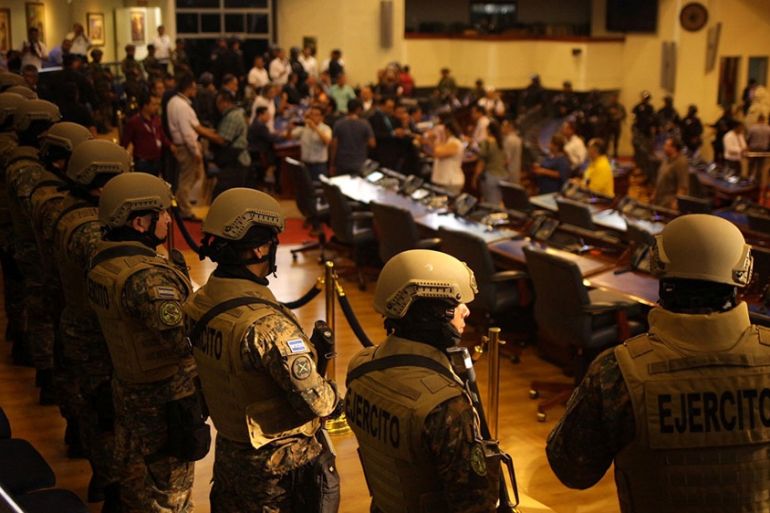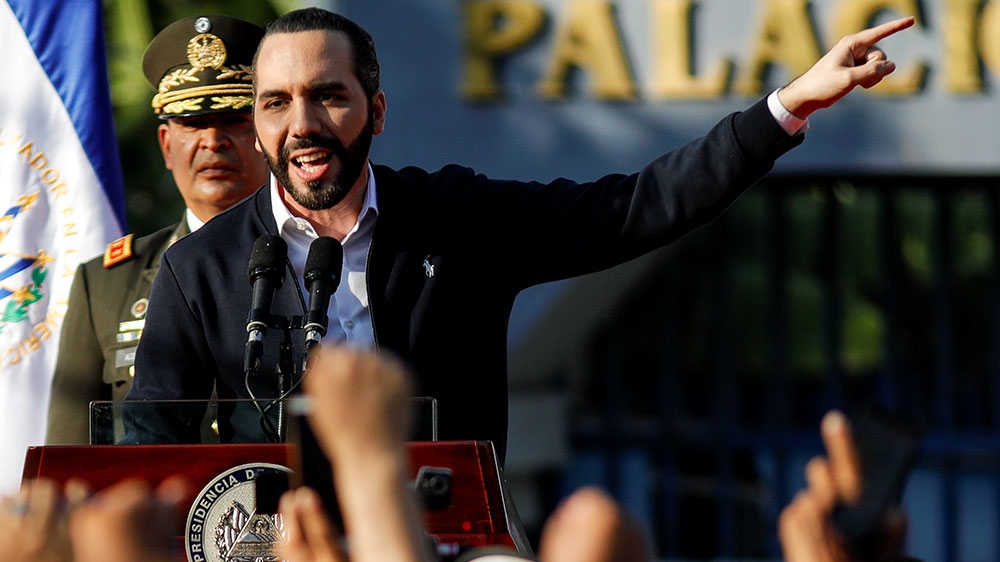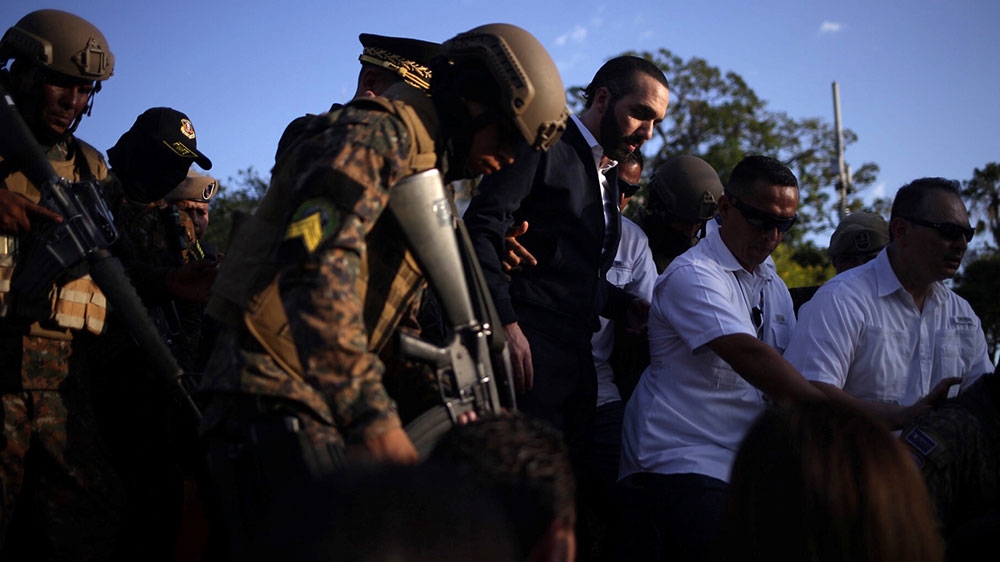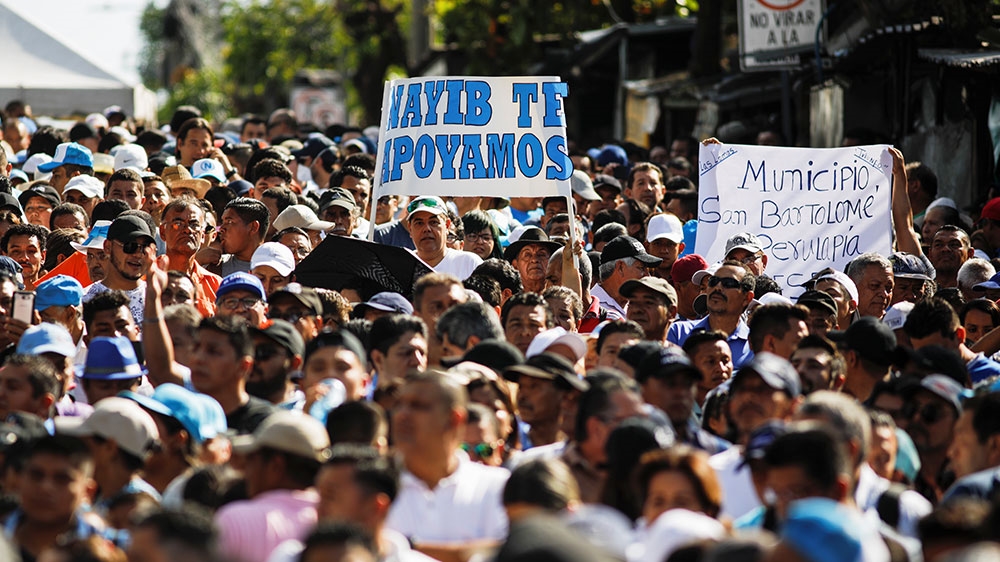Constitutional crisis in El Salvador over Bukele’s security plan
Backed by military officers, President Bukele briefly occupied legislature to demand vote on loan for security forces.

San Salvador, El Salvador – Thousands of Salvadorans gathered outside the country’s legislative assembly on Sunday as the country faced its most significant constitutional crisis since it signed a peace accord agreement to end a civil war in 1992. Military officers entered the legislative chamber in an unprecedented show of military power by President Nayib Bukele against the country’s legislators in the post-war period.
“I support him (the president),” said Rosario, 36, who is currently unemployed, outside the legislative assembly Sunday after the president addressed the crowd.
Keep reading
list of 3 itemsVenezuela expels El Salvador’s diplomats in ‘reciprocal’ move
US’s denial of Central America’s crisis will backfire
“We are just looking to improve the country in every way possible,” she added, wishing only to give her first name. But human rights groups say the president’s actions are a “smokescreen” that threatens the balance of separation of powers in the country.
The crisis started on Thursday night when Bukele called the country’s legislators to an emergency session scheduled for Sunday to approve a $109m loan for the third phase of his security plan, called “Plan Control Territorial”.
In a news conference, Bukele accused the legislative assembly of using the constitution in ways that did not benefit the Salvadoran people, reiterating a constant theme of his campaign in which he criticised the country’s corrupt politicians and painted himself as an outsider immune to this corruption. He invoked Article 167 of the country’s constitution, which says the president can convene the country’s national assembly extraordinarily “when the interests of the Republic demand it”.
When invoking this clause, he promised citizens to use the constitution for their benefit. But the decision set off a constitutional crisis as legislators, experts and human rights groups debated whether the situation merited the use of this clause.
Constitutional or unconstitutional?
Legislators challenged the president’s authority to call them to a special session to approve a loan.
At a news conference on Friday, Mario Ponce, the legislative assembly president, said the country is not in a “situation of catastrophe so that the Ministerial Council makes an urgent convocation of the legislators”.
The military also became involved in the dispute, stoking tensions in a country that lived a 12-year civil war that left more than 75,000 people killed. A UN truth commission found that the military was responsible for the majority of the bloodshed.
“The Salvadoran Armed Forces is a professional, apolitical and non-deliberation institution subordinate to the civil power and in consequence, we serve the nation and we will be obedient to the president and general commander of the Armed Forces,” said Defence Minister Rene Francis Merino Monroy in a news conference on Saturday during which the press were not allowed to ask questions.

Human rights groups were quick to draw parallels to the past. “The recent Latin American experience and the history of our country show that acting with intolerance, promoting hate and disrespecting institutions only leads to polarisation and confrontation between brothers,” wrote the Central American University, a historic defender of human rights in the country, in a statement.
Celia Medrano, chief programme officer of San Salvador-based human rights organisation Cristosal, said that it is a fallacy that the president’s actions were to “protect the security of Salvadorans”. Instead, the actions damaged the country’s institutions and she called for a return to the balance of powers in the country.
Supporters of the president say that critics have misrepresented the situation.
“For them, it’s an attack against democracy, but it’s not like that”, said 50-year-old industrial engineer Jose Manuel Munguia. “It’s totally the opposite. This is not a coup.”
Instead, supporters said they believe the president’s actions are for the good of the country. “What the president is doing is showing that he is for the people,” said 24-year-old teacher Douglas Hernandez. “What the president wants is the wellbeing of the people.”
Bukele rose to the presidency on promises to rid the country of corrupt politicians and take down gangs that have led El Salvador to consistently have some of the highest murder rates in the world. Soon after taking office in June 2019, Bukele implemented Plan Control Territorial, which targets gang hot spots and has increased military presence in these areas. The country experienced a 28 percent drop in homicides from 2018 to 2019. Bukele was quick to take credit, but analysts question the root of the decrease. Nevertheless, Bukele’s approval rating was nearly 90 percent as of December 2019. Citizens’ perception of the success of Plan Control Territorial could be one reason for this high approval rate.

Since November, Bukele has been pressuring the legislative assembly to approve the loan for the third part of his security plan, but they have asked for more time to discuss the details and reach a consensus.
“We came to pressure the legislators to approve a plan that will help our country,” said Alicia Garcia, a 25-year-old stay at home mom from a gang-controlled area about 45 minutes from the capital. “Because we are the ones who suffer in the colonias, not the legislators.”
The showdown
By 3pm (21:00 GMT) on Sunday, when the legislators were expected to arrive, thousands of Bukele supporters from all over the country had filled the street outside the national assembly, where the road had been closed off to traffic and military officers stood guard.
Inside the legislative assembly, enough legislators did not show up for a quorum to vote on the security plan. Military officers filled the chamber. “Now, I think it’s very clear who has control of the situation,” Bukele said.
Outside, Bukele addressed his supporters. He denied the statements from experts and legislators that he had overstepped his presidential power. “Where is the unconstitutionality?” he asked, to cries of support.
In the crowd were faint cries of “Let’s enter!” but the crowd remained fixated on the president and did not make a move to enter the assembly by force.

Bukele left and returned for a second speech with clearer instructions: he would give the legislators a week to approve the budget for his security plan. If they refused, he called his supporters back at the same time and place the following Sunday. As of Monday morning, the president of the assembly, Ponce, announced the suspension of Monday’s scheduled session to discuss the loan.
The international community called for the president to respect democratic institutions and refrain from using the military to solve problems with legislators. “The Salvadoran military should not be used to resolve disputes between the president and congress,” said Congressman Eliot Engel, chairman of the US House Foreign Affairs Committee. “Civilian differences should be resolved by civilian institutions.”
“The legislators are disobedient and arrogant,” said supporter Rosario. “I plan to come back next week.”